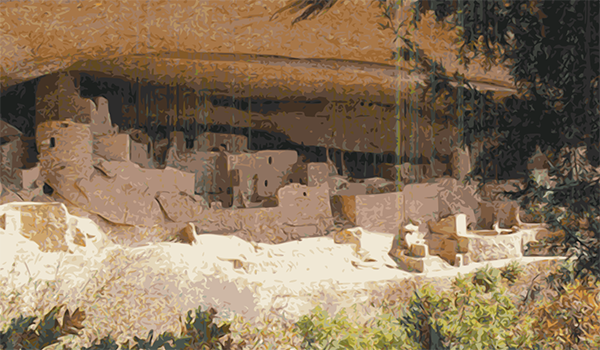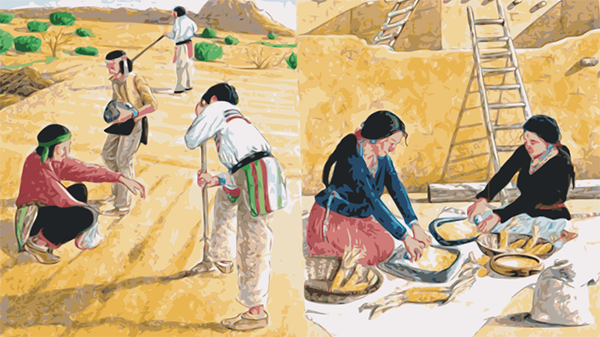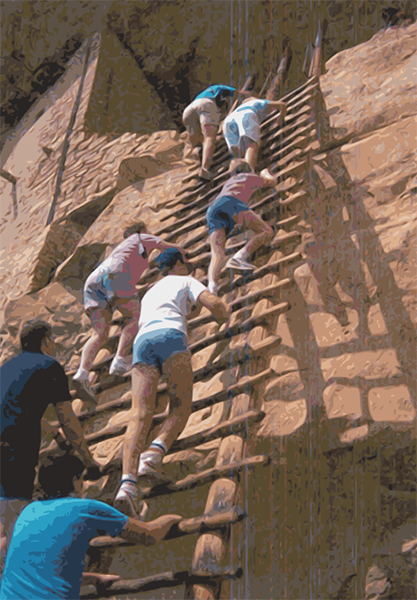The Mystery of the Cliff Dwellers
1 An ancient people lived high in the cliffs ... then disappeared. Or did they?
2 Mystery surrounds the ancestral Pueblo people. It swirls around them like the dry wind of the high country where they lived. Why did they build their homes in the cliffs? Why did they abandon those homes? And who were they, really? Even their name is a mystery. The Navajo called them the Anasazi, which means "ancient enemies." Today Pueblo Indians call them their Pueblo ancestors. No one knows what they called themselves.

3 A group of these ancient people settled at what is now Mesa Verde, in Colorado, about A.D. 550. At first, they dug pit houses in the mesa, or flat-topped hill. Around the year 1200, they began moving off the top of the mesa into high-altitude dwellings they built of stone and mud under the cliff ledges. No one knows why they made this move. It may have been to cultivate more farmland. Some archaeologists think they moved for protection.
4 "The cliff dwellings seem safe to me," says Kathrine Warren, ten, of Durango, Colorado. "People could climb up and pull the ladders behind them so their enemies couldn't get to them."

5 Kathrine visited the ruins of Cliff Palace, one of the cliff dwellings, with Leighana Sisneros and Landon Wigton, both ten and from Durango. "It would have been neat to be an Anasazi kid," Leighana says. "But" Kathrine observes, "you wouldn't have had things like lightbulbs, and I would have missed reading books." Landon adds, "There weren't any grocery stores." But the ancestral Pueblo people didn't need grocery stores. They grew most of their own food. The men planted corn, squash, and beans on top of the mesa. They conserved water in the dry climate by building dams and reservoirs. The women ground the corn on metates (meh TAH tays), or concave stones, and cooked it in pottery they made with ridged surfaces. They often painted their serving bowls.

6 'We climbed down into a kiva (KEE vuh)," says Landon. A kiva is an underground chamber. In its floor is a sipapu (SEE pah poo), or hole, symbolizing an opening between the physical world and the place where the Pueblo ancestors believed that life began.

7 "Only the men were allowed in the kiva," Landon says. There they held religious ceremonies and gathered to talk, perhaps about the weather as people do today. By the late 1200s, the weather must have been on their minds a lot. Archaeologists know that for many years little rain fell in the region. By 1300 the cliff dwellings of Mesa Verde had been abandoned. "Maybe the people left because of the drought," says Leighana. Some scientists agree. They think, too, that soil erosion, warfare, and disease may have driven them away. After so many years, the mysteries remain. But the ancient people probably did not vanish. Archaeologists and modern Pueblo people believe they migrated south. Today, through their descendants-the Pueblo Indians of Arizona and New Mexico-the ancient ones live on.
abandon | verb /əˈbændən/ التخلي
Leave something behind.
Similar words: desert, forsake, leave, quit
ancient | adjective /ˈeɪnʃənt/ قديم
Very old.
Similar words: old, antiquated, archaic, historic
archaeologists | noun /ˌɑrkiˈɑlədʒɪsts/ علماء الآثار
Scientists who study past human cultures through material remains.
Similar words: researchers, anthropologists, historians
beans | noun /binz/ الفاصولياء
One of the primary crops grown by the ancestral Pueblo people.
Similar words: legumes, pulses, seeds, grains
chamber | noun /ˈʧeɪmbər/ غرفة
A room.
Similar words: room, compartment, space, enclosure
climate | noun /ˈklaɪmət/ المناخ
The type of weather that a place has.
Similar words: weather, atmosphere, conditions, temperature
concave | adjective /ˈkɒnˌkeɪv/ مقعر
Curving inward.
Similar words: hollow, sunken, curved, indented
concave stones | noun phrase /kɒnˈkeɪv stoʊnz/ أحجار مقعرة
Stones used to grind corn into flour by the Pueblo women.
Similar words: grinding stones, millstones, querns
conserved | verb /kənˈsɜrvd/ حفظ
Saved or protected from harm.
Similar words: preserved, saved, maintained, stored
cultivate | verb /ˈkʌltɪˌveɪt/ زراعة
Prepare land to grow food, trees, and flowers.
Similar words: farm, tend, grow, sow
dams | noun /dæmz/ سدود
Walls built across rivers to stop the water.
Similar words: barriers, embankments, levees, floodgates
descendants | noun /dɪˈsɛndənts/ أحفاد
People related to a previous generation or group.
Similar words: offspring, heirs, successors, progeny
disappeared | verb /ˌdɪsəˈpɪrd/ اختفى
Went out of sight.
Similar words: vanished, faded, evaporated, gone
drought | noun /draʊt/ جفاف
A time of little or no rainfall.
Similar words: dry spell, aridity, water shortage, famine
dwellings | noun /ˈdwɛlɪŋz/ مساكن
Places where people live.
Similar words: homes, residences, shelters, abodes
enemies | noun /ˈɛnəmiz/ أعداء
People who want to harm you.
Similar words: adversaries, foes, rivals, opponents
erosion | noun /ɪˈroʊʒən/ تعرية
When soil washes or blows away due to weather.
Similar words: weathering, degradation, depletion, decay
ladders | noun /ˈlædərz/ سلالم
Tools used to climb up or down from the cliff dwellings.
Similar words: stairs, steps, rungs, climbs
ledges | noun /lɛʤɪz/ رفوف صخرية
Flat areas of rock that stick out.
Similar words: shelves, ridges, projections, outcrops
lightbulbs | noun /ˈlaɪtˌbʌlbz/ المصابيح الكهربائية
Round glass parts of electric lights.
Similar words: lamps, bulbs, illuminators, filaments
metates | noun /məˈtɑteɪz/ أحجار الطحين
Grinding stones used to turn corn into flour.
Similar words: millstones, grinders, querns, mortars
migrated | verb /maɪˈgreɪtɪd/ هاجر
Moved from one area to another.
Similar words: relocated, moved, traveled, emigrated
mud | noun /mʌd/ طين
A material used to build the cliff dwellings.
Similar words: clay, soil, earth, silt
mystery | noun /ˈmɪstəri/ لغز
Refers to the unknown reasons behind the abandonment.
Similar words: puzzle, enigma, riddle, secret
physical | adjective /ˈfɪzɪkəl/ مادي
Related to objects in the real world.
Similar words: tangible, material, concrete, solid
pit houses | noun phrase /pɪt haʊsɪz/ المنازل المحفورة
Early homes dug into the ground by the ancestral Pueblo people.
Similar words: earth lodges, dugouts, sunken homes, huts
pottery | noun /ˈpɑtəri/ الفخار
Clay objects made by the Pueblo people, used for cooking and serving food.
Similar words: ceramics, earthenware, crockery, stoneware
protection | noun /prəˈtɛkʃən/ الحماية
Something that keeps you from being hurt.
Similar words: defense, security, shelter, safeguard
reservoirs | noun /ˈrɛzərvwɑrz/ خزانات المياه
Bodies of water saved for use.
Similar words: storage basins, water tanks, lakes, cisterns
ridged surfaces | noun phrase /rɪdʒd ˈsɜrfɪsɪz/ أسطح محززة
Textured surfaces on pottery made by the Pueblo people.
Similar words: grooved surfaces, ribbed textures, lined surfaces
ruins | noun /ˈruɪnz/ الأطلال
Broken parts of old buildings.
Similar words: remains, debris, wreckage, relics
sipapu | noun /ˈsiːpɑpuː/ سيبابو
A small hole in the floor of a kiva, symbolizing the origin of life in Pueblo beliefs.
Similar words: spiritual hole, ceremonial hole, sacred portal
soil erosion | noun phrase /sɔɪl ɪˈroʊʒən/ تعرية التربة
The process of soil being worn away.
Similar words: degradation, depletion, soil loss
squash | noun /skwɑʃ/ القرع
A type of vegetable grown by the Pueblo people.
Similar words: gourd, pumpkin, courgette, marrow
stone | noun /stoʊn/ الحجر
A material used in building the cliff dwellings.
Similar words: rock, granite, limestone, boulder
surrounds | verb /səˈraʊndz/ يحيط
Is all around something.
Similar words: encircles, encloses, encompasses, borders
swirls | verb /swɜrlz/ دوامات
Moves in a twisting and turning motion.
Similar words: spirals, twirls, twists, curls
symbolizing | verb /ˈsɪmbəˌlaɪzɪŋ/ يرمز
Representing something through symbols.
Similar words: signifying, representing, standing for
underground | adjective /ˈʌndərˌɡraʊnd/ تحت الأرض
Located below Earth's surface.
Similar words: subterranean, buried, below ground, hidden
vanish | verb /ˈvænɪʃ/ يختفي
Disappear suddenly.
Similar words: fade, disappear, dissolve, evaporate
warfare | noun /ˈwɔrˌfɛr/ حرب
Armed conflict, which may have played a role in the abandonment.
Similar words: conflict, battle, fighting, combat

